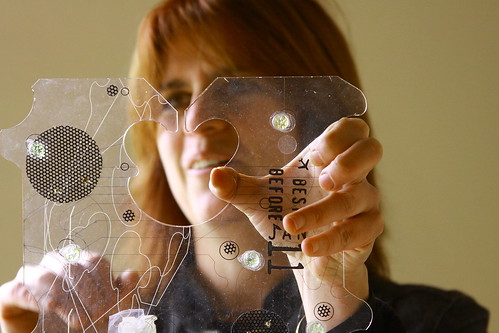///005 MAÍZ: LA COMIDA Y EL CONSUMISMO by Marco Benigno

Claudia Ramirez recreates Mexico’s edible spoon in protest of GM foods (MFB)
TIJUANA – Roasted, ground, flattened, and refined, corn is the Mexican staple.
While its white variety is indigenous to the land, according to the U.S. Agriculture
Department, 89% of Mexico’s yellow corn is imported almost entirely from the U.S.,
a dependency that has alarmed the Mexican government.
In light of global food shortages and rising food prices, officials have taken controversial
measures to reduce its dependency on foreign exports. Last fall, the government issued
genetically modified (GM) seed permits to boost production in unarable regions.
Angered by the decision, small farmers and environmentalists have protested in fear that
the move would lead to the contamination of their native corn. Although GM seeds have
been proven to increase yield of crop and improve its resistance to pests and drought,
their long term effects on human health and the ecosystem remain unknown.
But the concern for activists like Tijuana-based Claudia Ramirez lies not only in the
ambiguous science of GM crops but more importantly in the privatization of seeds and
its subsequent displacement of independent and indigenous farmers.
Through mixed-media art, Claudia participates in the movement against GM seeds,
advocating the importance of organic farming and smart consumerism.
Her latest work recreates Mexico’s edible spoon by branding tortillas with messages
contra GM corn. Here, she links the viability of government-supported transgénico
(gene modification) programs to the blind consumption of the Mexican consumer.

Claudia’s visual art or artes plásticas deconstructs consumerism (MFB)
Influenced by the Aztec tradition of floy y canto (flower and song and the poetry of life),
her work weaves an intricate portrayal of the relationship between la gente and la terra.
She demonstrates how GM seeds, driven by mass production and profit, destroy the
transmission of traditional farming and history itself. On her blog she writes about the
destruction of the elderly and oral tradition:
Los ancianos son las personas más cercanas a los modos antiguos a ellos recurrimos cuando de preservar se trata, sin embargo hoy en día los abuelos contienen la información pero los foros tradicionales, ó sea la familia, la comunidad, son sustituidos por asilos ó simplemente son ignorados, rompiendo así una cadena de transmisión importantísima.
The elderly are those closest to the ancient ways. We turn to them when we need to preserve these traditions. But nowadays our grandparents possess the information but traditional institutions in particular the family and the community are simply ignored; thus, breaking an important mode of transmission.
Modification of crops at the genetic level bypasses natural selection and quells centuries of
organic propagation practices like layering and grafting, techniques that have been passed
down generation after generation and that are believed to act harmoniously with the adaptive
tools of evolution.
In addition to her visual expressions, Claudia leads interactive workshops, in which she educates and empowers youth to embrace their right to plant and consume organic corn. Treading against the tide of corporate ownership, her work strives to preserve sustainable traditions and promote self-awareness and agency.
Etiquetas: Tags: Claudia Ramirez Tijuana Mexico Corn Transgenico Gene Modification Flor y Canto


0 Comentarios:
Publicar un comentario
Suscribirse a Comentarios de la entrada [Atom]
<< Página Principal